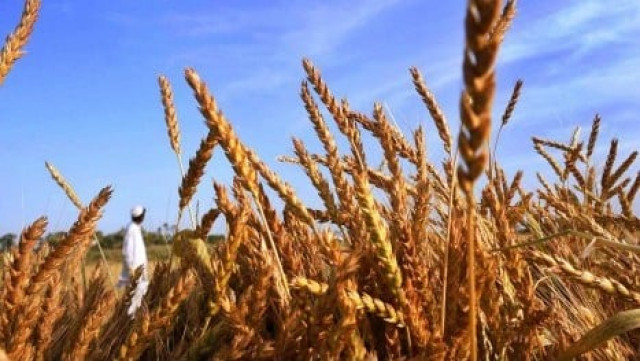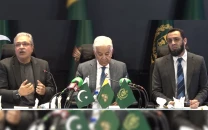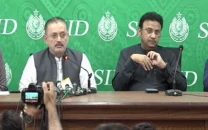Wheat subsidy for 40% G-B population goes
ECC decides to recover additional Rs17b from domestic gas consumers to subsidise fertiliser plants

The interim government on Thursday reinforced its decision to recover additional Rs17 billion from the domestic gas consumers for paying subsidies to fertiliser plants and also approved the withdrawal of wheat subsidy for 40% population of Gilgit-Baltistan (G-B).
The Economic Coordination Committee (ECC) of the Cabinet also approved Rs396 million funds for repair of ministers’ homes, a structure at the Prime Minister’s House and construction of the Supreme Court monument, according to a finance ministry handout.
The money had not been budgeted but it would be given by the finance ministry by deducting from other heads. It approved summaries from the housing and works ministry and the PWD for provision of funds worth Rs25 million, Rs319.5 million and allocation of Rs51.96 million for various projects.
The ECC “gave approval” to a comprehensive sustainable plan for price rationalisation of subsidised wheat in Gilgit-Baltistan, according to the ministry statement. It approved to withdraw wheat subsidy for the 40% population of G-B, falling in two higher income brackets.
The wheat subsidy of the fifth income quantile stood immediately withdrawn, affecting about 228,000 people, out of 1.2 million total population. For the fourth income quantile, it would be withdrawn after the ground survey.
The Kashmir and Gilgit-Baltistan affairs ministry had also demanded Rs6 billion additional funds and 150,000 metric tons more wheat to provide the subsidised commodity. The ECC decided in principle to give the money, however, the source of funding could not be established.
Some ECC members advocated continuing the subsidy but the finance ministry firmly opposed it. The special region gets wheat at Rs13 per kilogramme as against Rs130 per kilogramme in the rest of Pakistan.
Both finance and the Kashmir and Gilgit-Baltistan Affairs ministries would work out the modalities to provide the money for subsidy for the remaining 60% of the population, according to the decision, which had been taken at a time when the G-B population was protesting against the withdrawal of the subsidy.
The ECC also approved to recover Rs17 billion additional from the domestic gas consumers to pay for the subsidies to two fertiliser plants based in Punjab. The money should have been given from the budget but its burden had been passed on to the domestic consumers, who were already facing up to 1,108% increase in gas prices.
The Petroleum Division had proposed that the supply of RLNG to FatimaFert and Agirtech Ltd may be continued at Rs1,239 per mmbtu for the period of January to March 2024 and the differential of price with RLNG for such supply to be treated as RLNG diversion to domestic sector for recovery through SNGPL’s revenue requirements to be determined by Ogra.
In November last year, the ECC had approved to continue supply of RLNG to both fertiliser plants – the FatimaFert and the Agritech – till end December at OGRA determined rate of Rs1,239 per mmbtu.
The price differential between OGRA’s notified RLNG price and Rs1,239 per mmbtu will be made part of revenue requirements of the SNGPL by OGRA in its revenue requirement determination in January, 2024, according to the decision.
Also, the prime minister had chaired a meeting in December on fertiliser issues and directed that the provincial governments should contribute to the subsidy as per their share in urea dispatches for gas supplied to urea manufacturers from January-March 2024.
Subsequently, the SIFC decided that the federal government should contribute a subsidy of around Rs20 billion on LNG for fertiliser plants but since agriculture was a provincial subject, the provinces must contribute by sharing the burden of this subsidy.
However, none of the provinces agreed to contribute in the cost differential, rather they opined that RLNG at full cost may be supplied to both the plants for urea production and produced urea may accordingly be sold at full cost recovery.
Only element of cost of RLNG in urea per bag at current RLNG price of $13 per mmbtu works out to be Rs5,600 per bag, excluding other incidentals, therefore, selling of produced urea at notified RLNG price will distort the entire urea supply market, leading to undue profiteering by sellers at the cost of farmers.
The ECC approved Rs500 million grant for modernisation Of Hydromet Services. It also approved Rs38.9 million for Institutional Reforms Cell (IRC) from Cabinet Division and summary for Importation of Sahiwal Bull from Pakistan as semen donors for the National Artificial Insemination (AI) Programme from the commerce ministry was also approved by the ECC after discussion.
The summaries of the finance ministry for approval of the Technical Supplementary Grant (TSG) for Rehabilitation of flood damaged rural roads in Khyber-Pakhtunkhwa through the Counter-Value Fund deposited under the Japanese grant aid, and provision of clean drinking water were also approved.
The ECC approved provision of additional funds amounting to Rs1.6 billion through technical supplementary grant for the procurement of servers and hiring consultants. The ECC gave approval to Rs7.15 billion for “Actions To Strengthen Performance For Inclusive And Responsive Education”(ASPIRE) for federal education and professional training.
The summary presented by the food security ministry regarding demand and supply of wheat in the country was discussed at length and got approved. The ECC also gave approval of Rs4 billion for 7th Population & Housing Census.
In a major decision, it approved to convert power purchase agreement on new lending instrument, transitioning from London Inter-Bank offer rate (Libor) to Secured Overnight Financing Rate (SOFR). This will increase the idle capacity payment charges.
Meanwhile the G-B government agreed to increase wheat quota from 1.1 million bags to 1.6 million bags, which would cater to the needs of the people the region, according to a notification issued here on Thursday.
The notification said that one kilogramme of wheat would now be available t Rs220 instead of Rs360, which was fixed during December 2023. According to the announcement, in the quota enhancement, each person would now receive 7.315 kilograms of wheat instead of 3 kilogrammes.
(WITH INPUT FROM APP)


















COMMENTS
Comments are moderated and generally will be posted if they are on-topic and not abusive.
For more information, please see our Comments FAQ